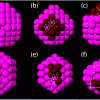Preparing students for 21st Century research
The Challenge:
Creating opportunities for New Zealand postgraduate students to learn and build the skills required for computational research, no matter what their field of science.The Solution:
Developing a postgraduate paper focused on practical skills that prepare students for the process and practice of using national-scale research facilities.The Outcome:
Post-graduate students empowered with practical experience and critical thinking skills they can carry through into the next chapter of their careers in computational research.
Following a recent review of its School of Science offerings, the University of Waikato recently piloted a new practical-focused paper that aims to better prepare early career researchers for running computational science projects on national-scale facilities.
“When we talked with postgrad students, they talked a lot about wanting to learn by doing,” says Jo Lane, Deputy Dean of Science and an Associate Professor at the University of Waikato. “They saw postgrad study as different than undergrad study.”
Taking a cue from that feedback, Jo saw an opportunity to create a paper that was accessible to students from all science backgrounds and explore what a research project looks like when using a national-scale facility, such as NeSI. That paper was piloted in the second-half of 2019 with its first class of 15 postgraduate students.
“Effectively we were taking somebody who knows nothing about running simulations to actually being able to run on NeSI,” he says, but noted the practical components in the paper apply to more than just High Performance Computing (HPC) facilities. “Several times through the course we talked about how this is also the same sort of process that you would run through if you’d apply for beamline time at a facility like the Australian synchrotron.”
Most national-scale resources are built around a similar model: researchers apply by putting together a proposal or some sort of request, and if approved, they need to run their work alongside hundreds, if not thousands, of other researchers on a portion of a shared resource.
“I reflected on myself and my own learnings,” says Jo about how he developed the curriculum. “This process of getting a new user on NeSI is something I’ve had to do individually, one-on-one many times. I was thinking about the postgrad students I’ve been supervising and what are the things they need to know and the different pieces.”
He consulted with NeSI to develop some of the paper’s overview materials and assessment components, and he even brought in members of NeSI’s Support team for hands-on help.
“Most people had very low experience levels,” he noted. “I think there were two people who’d used Linux before. Apart from that, everyone else were complete beginners.”
With so few students familiar with using Linux, it made for a steep learning curve on the day they learned how to set up their NeSI accounts.
“I think about half the class locked themselves out within about 10 minutes of starting that workshop,” Jo recalled with a laugh. “So it was pretty important that we had someone (from NeSI) there on the ground, that made a massive difference.”
From start to finish, the students gained experience in how to scope a research project and then engage with a large national-scale facility to navigate the application process, understand the criteria required for such a project, discover how resource applications are evaluated, and then successfully run their project on the system.
“Some people did exceptionally good jobs,” he says, noting two of the final reports could have easily been submitted to good quality journals if the science had shown what they’d hoped it would. “Most students in the class were able to do good, useful research as a part of what they did.”
The earlier preparatory assignments throughout this paper ranged from learning the basics of command line, to applying for a NeSI account, to benchmarking code. The benchmarking tasks featured sessions on parallelisation and introduced concepts of workflow, all aimed to get students thinking about and experimenting with how to use NeSI resources efficiently.
“One of the things we talked a lot around was support and errors and how you deal with that,” Jo says. “Most of the codes people are using are very common codes, and so there are a lot of forums that exist that have this information. I think that’s an honest way of how to represent how a lot of computational research occurs at the moment. I think that was encouraging for students to realise that their professor, when they get a weird error message, will Google it.”
Trying things, learning from mistakes, asking questions, and taking initiative were all part of the practical research skills this paper aimed to introduce. Also, with national-scale facilities being used to support research across domains, the knowledge around processes and expectations of these kinds of shared resources will support students with future stages of their research careers.
“I think that was quite helpful for students in that they were learning transferable skills that weren’t just around HPC and the data space, but were skills they could offer a PhD group,” he says.
Ultimately, Jo hopes other institutions will be interested in this paper’s approach of embracing a more practical focus on postgraduate level study.
“What you want postgrads to be is excited about the results from their code,” he says. “They should be spending more time on the results than the process of setting up jobs and getting them running.”
Jo shared some lessons learned and future plans around this paper in a presentation at eResearch NZ 2020. The next delivery of the paper at the University of Waikato will be in July this year.
Do you have an example of how NeSI platforms have supported your work? We’re always looking for projects to feature as a case study. Get in touch by emailing support@nesi.org.nz.







